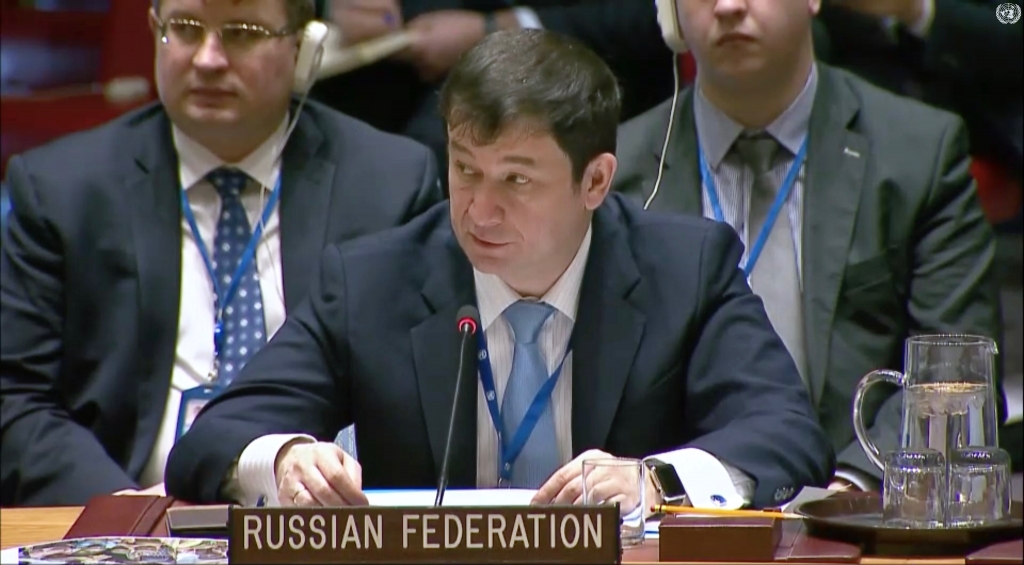Statement by Mr.Dmitry Polyansky, First Deputy Permanent Representative of the Russian Federation to the United Nations, at the Security Council on the humanitarian sitiation in DR Congo
We have taken note of the report by Mr. Lowcock, Under-Secretary-General for Humanitarian Affairs, and we are grateful for his informative briefing and those of the other briefers, which were also helpful.
We are concerned about the rapid deterioration in the humanitarian situation in the Democratic Republic of the Congo. It is sad that during the past year alone, according to United Nations estimates, we have seen the number of people in need of humanitarian aid grow by 50 per cent, while the cost of the humanitarian response plan for the country has almost doubled.
We agree with the view that the reasons for the worsening humanitarian situation lie in the continuing inter-ethnic clashes and the activities of armed groups in the northern and eastern regions of the country. The situation with regard to food security, sanitation and epidemics is particularly worrying. A new wave of refugees will have negative humanitarian consequences both for the Democratic Republic of the Congo’s neighbours, many of which are already dealing with acute humanitarian crises, and the Great Lakes region as a whole.
These developments pose new challenges for the humanitarian community that it is unlikely to be able to cope with, considering the current funding available for humanitarian assistance. It will be essential for donors to step up their support for United Nations activities in the Democratic Republic of the Congo and its neighbours.
For its part, Russia will continue to support such efforts. In particular, we are taking steps to relieve African countries’ long-term debt. To date, we have written off more than $20 billion of underlying debt within the framework of the Heavily Indebted Poor Country Initiative, as well as implementing debtfor-development swaps. We consistently contribute to international assistance programmes for Africa through the International Monetary Fund, the World Bank, the World Health Organization, UNICEF, the World Food Programme (WFP) and the International Civil Defence Organization, and we also provide aid to the health sector.
We were one of the first countries to respond to the Ebola epidemic, contributing more than $60 million to combating it. I would like to take this opportunity to express our gratitude to those neighbours of the Democratic Republic of the Congo who have been helping Congolese refugees. We will continue to provide them with appropriate assistance. Last year Russia sent dozens of KAMAZ trucks to Uganda for use in United Nations humanitarian operations there, and we plan to transfer additional transport units for use in Uganda to the WFP this year as well.
With regard to the country’s overall situation, we hope that ensuring that the presidential elections scheduled for 23 December are held on time will help to reduce tensions in Congolese society. We call on the opposition forces to cooperate more actively with the Independent National Electoral Commission, recognize its proposed election dates and to refrain from any acts of violence.
We are opposed to any efforts to mentor or impose recipes on Kinshasa regarding election issues. Nor should MONUSCO’s role go beyond providing technical and logistical assistance to the national authorities in organizing and conducting the elections. The primary responsibility for normalizing the situation in the Democratic Republic of the Congo belongs to its citizens themselves, and respect for the country’s sovereignty is an absolute imperative.
We again urge the Blue Helmets to act in accordance with the basic principles of peacebuilding and not to permit any interference in Kinshasa’s internal affairs. Any situation in which MONUSCO supports a particular Congolese party is to be avoided at all costs. We assume that the Mission’s main function is to stabilize the security situation, which in itself would also help to improve humanitarian access.
In that connection, we would like to draw the Council’s attention to the renewed activity of illegal armed groups in the eastern Democratic Republic of the Congo, where civilians, Government security forces and peacekeepers are being systematically attacked. We are also concerned about the reports that after years of quiet, inter-tribal conflicts in the north-east of the country have broken out again.
Needless to say, we were all concerned about the series of rebel attacks on peacekeepers at the end of last year. All of those factors should be taken into account during the work on the new mandate for the United Nations presence in the Democratic Republic of the Congo.
We see no justification for the proposals in the Secretary-General’s report on the results of the strategic review (S/2017/826) for reducing MONUSCO’s implementation of its stabilization efforts and its cooperation with Kinshasa in support of the camps for ex-combatants. It will be impossible to ensure long-term solutions to the problem of armed groups without restoring State authority in the eastern part of the country and resolving the issue of the repatriation of former combatants. The implementation of the protection through projection concept endorsed by the Secretariat will hardly help to strengthen the security of civilians or ensure humanitarian access.
At this meeting, we would also like to take the opportunity to raise the issue of the working methods of the Council. As the discussion has shown, it is hardly worthwhile to discuss the humanitarian crisis in the Democratic Republic of the Congo separately from the military and political context. We would draw the attention of the Council to the fact that many of the ideas proposed by participants at today’s meeting were also heard at the meeting on 7 March (see S/PV.8198). In that regard, we believe that it is important to prevent briefings that largely overlap in order not to reduce the effectiveness of the Council’s work.
